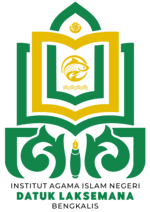Improving Students' Speaking Skill by Using Task Based Learning Technique at First Semester of English Education Study Program STAIN Bengkalis
DOI:
https://doi.org/10.56633/jkp.v19i1.509Keywords:
Task based learning, speaking skillAbstract
This research aims to explain the extent to which task based learning (TBL) technique can improve the students’ speaking skill and what factors that influence the changes of the students’ speaking skill by implementing TBL technique. This research is a classroom action research (CAR), which was conducted in two cycles. The instruments that were used to collect the data were speaking test, observation sheet, field notes, and interview guide. The data were analyzed quantitatively and qualitatively. The findings reveal that the implementation of TBL technique can improve the students’ speaking skill at first semester of English Education Study Program STAIN Bengkalis. It was showed from the students’ average score. The mean score before conducting the research was 2.62, the mean score of cycle 1 was 2.98, and the mean score of cycle 2 was 3.38. Besides, this research also found the factors that influence the changes of the students’ speaking skill by implementing TBL technique namely, real world material, interaction, and lecturer’s role. Therefore, it can be concluded that TBL technique is effective in teaching speaking. While, real world material, interaction, and lecturer’s role influence the improvement of the students’ speaking skill at first semester of TBI.
References
Amlas. 2009. Improving Students’ Writing Skill through TBL at the First Grade of Animal Husbandry Class of Vocational High School 2 Batu Sangkar. Padang: Unpublished Thesis.
Erten, İsmail Hakkı, and Meryem Altay. 2009. “The Effects of Task-Based Group Activities on Students’ Collaborative Behaviours in EFL Speaking Classes.” Journal of Theory & Practice in Education (JTPE) 5 (1): 33–52. http://content.ebscohost.com/ContentServer.asp?T=P&P=AN&K=36488633&S=R&D=ehh&EbscoContent=dGJyMNLe80SeqLI4zOX0OLCmr0meprdSr664SK+WxWXS&ContentCustomer=dGJyMOzpsEi0rrRJuePfgeyx44Dt6fIA%5Cnhttp://search.ebscohost.com/login.aspx?direct=true&db=ehh&AN=3648863.
H. Douglas Brown. 2012. PRINCIPLES of LANGUAGE LEARNING AND TEACHING. Encyclopedia of the Sciences of Learning. https://doi.org/10.1007/978-1-4419-1428-6_347.
Jane Willis. 1996. A Framework for Task-Based Learning. Harlow: Longman.
Larsen-Freeman, D. and long. 1991. An Introduction to Second Language Acquisition Research. London: Longman.
Nazenin Ruso. 2007. “The Influence of Task Based Learning on EFL Classrooms.” Pharmacology, Biochemistry and Behavior 18: 563–67. https://doi.org/10.1016/0091-3057(91)90128-O.
Nunan, David. 2004. Task-Based Language Teaching. Cambridge: Cambridge University Press. https://doi.org/10.1017/CBO9780511667336.
Richard, Jack. 2006. Communicative Language Teaching Today. Cambridge: University Press.
Rod Elilis. 2003. Task-Based Language Learning and Teaching. Oxford: Oxford University Press.
Downloads
Additional Files
Published
Issue
Section
License
Authors who publish with this journal agree to the following terms:
- Authors retain copyright and grant the journal right of first publication with the work simultaneously licensed under a Creative Commons Attribution-ShareAlike 4.0 International License. that allows others to share the work with an acknowledgement of the work's authorship and initial publication in this journal.
- Authors are able to enter into separate, additional contractual arrangements for the non-exclusive distribution of the journal's published version of the work (e.g., post it to an institutional repository or publish it in a book), with an acknowledgement of its initial publication in this journal.
- Authors are permitted and encouraged to post their work online (e.g., in institutional repositories or on their website) prior to and during the submission process, as it can lead to productive exchanges, as well as earlier and greater citation of published work (See The Effect of Open Access).






